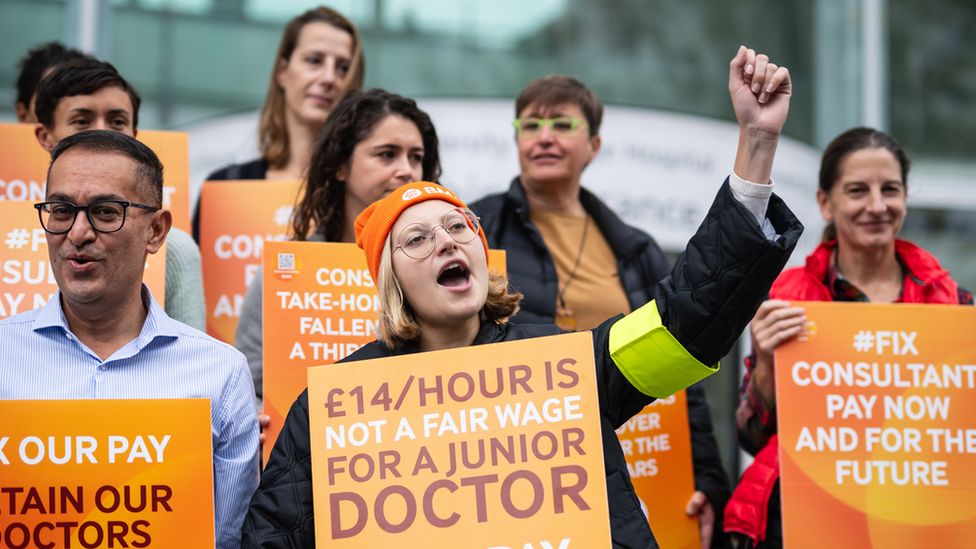ARTICLE AD BOX
 Image source, Getty Images
Image source, Getty Images
Junior doctors and consultants in England have already staged strike action in their dispute over pay
Junior doctors in Northern Ireland have voted to take strike action for the first time.
The result of the six-week ballot could see junior doctors taking part in a 24-hour walkout from 6 to 7 March.
The decision has been voted for as part of a long-running dispute over pay.
Of those balloted, 97.6% voted in favour of going on strike, the British Medical Association (BMA) said, adding that it showed junior doctors felt they had no other choice.
There was a 63.7% turnout for the ballot.
A newly qualified doctor in Northern Ireland earns £26,000 per year; in England the starting rate is over £33,000, and in Scotland it is £32,000.
The union said junior doctors' salaries in Northern Ireland had fallen by 30% over the past 15 years.
'Disappointed and disheartened'
Dr Fiona Griffin, chairwoman of the BMA's Northern Ireland junior doctors committee, said the yes vote was "a clear indication of the strength of feeling among junior doctors about years of pay erosion".
The BMA said there had been "a renewed sense of hope" on progress on pay with the return of a functioning Stormont executive and £688m being allocated by the executive for public sector pay increases.
But Dr Griffin added that a recent pay meeting between Department of Health officials and the BMA left junior doctors feeling "extremely disappointed and disheartened".
"We entered that meeting with the hope that good faith negotiations would commence on doctors' pay asks," she said.
"Instead we were presented with a fait accompli of a below inflation 6% uplift, that will be awarded in the next financial year.
"We were told any further discussions on pay had to be delayed until the ongoing Westminster pay negotiations with doctors in England had concluded, despite health and pay being devolved matters."
In a statement to BBC News NI on Friday - before the result of the ballot was known - the Department of Health said it would continue to move forward in its negotiations with unions and remained "hopeful that a satisfactory solution for all parties can be reached".
It said it was "acutely aware of the pressures faced by doctors and concerns raised in relation to pay" and Health Minister Robin Swann was clear "resolving ongoing pay disputes is an immediate priority".
Dr Tim Neill said junior doctors "don't feel valued"
Dr Tim Neill, who voted in favour of taking strike action, said students were deciding against medical careers while others were leaving the profession because they "don't feel valued in the work that they do".
Dr Neill described an "era of quiet quitting" among doctors who feel "powerless" and "restricted" in their ability to do the job.
"It takes a lot to take the wind out of your sails when you go into medicine to help people, but too often now we're seeing doctors losing that," he said.

 1 year ago
53
1 year ago
53








 English (US) ·
English (US) ·